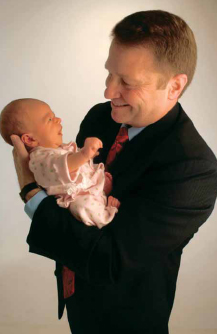Three years ago, I received a tragic phone call from a friend. Her sister, whom I'll call Mary -- a bright young woman who had struggled with bipolar disorder throughout her life -- had recently given birth to her second child. Mary had chosen to go off her psychiatric medications during pregnancy and breastfeeding. This hadn't posed a problem during and after the birth of her first child. But this time, it led to disaster.
Lack of sleep, stress from caring for a toddler and a newborn, and problems at work took their toll on Mary. She began to spiral, pacing and panicking. Just as her husband was about to take her to the hospital for treatment, Mary slipped into a psychotic episode. She heard voices telling her to attack her husband and children -- which she did, with a knife.
Thankfully, Mary's husband was able to wrestle the knife away and prevent her from causing any real physical harm. But the damage had been done. The government accused Mary of attempted murder and domestic violence assault. Mary was sent to prison and later a psychiatric hospital. She was forbidden from having any contact with her children. Only last month was Mary permitted her first visit with her now 3-year-old, who has no memory of his mother.
This is obviously an extreme illustration of what can happen when pregnant and breastfeeding women don't treat their own illnesses out of fear of harming their children. But my closeness to the incident has made me extra sensitive to the issue, which is so important yet rarely discussed in our society or media.
Which is why I was so excited to hear that a dear friend of mine, writer/editor Kate Rope, had taken a position as editorial director for a new non-profit called the Seleni Institute. Seleni is dedicated to women's reproductive and maternal mental health. It offers online resources and support as well as research funding for women's mental health issues. And, in early May, Seleni will open a clinic in Manhattan to serve women during this critical time in their lives.
Kate, who has been a health journalist for the past 15 years, began focusing on the mental health issues of motherhood after her own difficult pregnancy. Just one week after conceiving her first child, Kate ended up in the emergency room with horrible chest pain. The doctors, worried that she had a blood clot, gave her a CT scan -- but found no answers.
For the next five months, Kate suffered from debilitating pain that was misdiagnosed as heartburn. When several different medications brought no relief, she ended up in the hospital again. After three days of tests -- including one that involved nuclear radiation -- she had a diagnosis: inflammation and fluid around her heart. For the rest of her pregnancy, she had to take ibuprofen and steroids to control it.
And she worried about the health of her baby constantly. "Everyone around me was planning home births and practicing prenatal yoga. Meanwhile, I was doing all the things pregnancy books say are dangerous -- taking medications and getting X-rays. I felt very alone and scared."
Kate's story has a happy ending: Not only did she eventually get the diagnosis and treatment she needed, but also she gave birth to a beautiful, healthy daughter. Still, the experience traumatized her and led to two outcomes: postpartum anxiety so severe she needed medication to treat it, and a personal commitment to helping other women facing the same choices get good information and peace of mind.

Kate got help for her postpartum anxiety and went on to co-author The Complete Guide to Medications During Pregnancy and Breastfeeding with Carl P. Weiner, M.D., a perinatologist and professor of pharmaceutical sciences at the University of Kansas School of Medicine.
Kate explained to me that there is very little well-researched information about the safety or effectiveness of meds during pregnancy and breastfeeding. Most pharmaceutical companies won't do controlled clinical studies because of concerns about liability. Therefore, much of the information doctors use to make prescribing decisions comes from doctor's case studies, animal research, and epidemiological evidence.
Dr. Weiner had already combined all of this scattered information into an academic text to help doctors choose appropriate medications to their pregnant and breastfeeding patients. Kate helped him translate that text into an easy-to-understand, A-to-Z directory of over-the-counter and prescription medications for pregnant and breastfeeding moms. It also explains how to find good medical care if you have a chronic condition or develop complications during pregnancy.
"We want pregnant and breastfeeding women to have good information and to know that they are not alone and they don't have to sacrifice their wellbeing for their baby's health. We want to help them make good decisions with their health care providers," says Kate.
If you are planning to become pregnant and require medication for physical or psychological conditions, Kate and Dr. Weiner recommend getting informed before trying to conceive. "Meet with your doctors -- your psychiatrist, OB-GYN, midwife, or specialist -- and talk through your concerns," says Kate. "Ask them what they know about the medications you take, their risks and benefits, and whether or not you should switch to a safer option or discontinue treatment during pregnancy."
Of course, you may not have the chance to prepare (half of all pregnancies are unplanned). In that case, don't make any choices about stopping or starting medications on your own. Meet with your health care providers right away to discuss your treatment.
And whether you plan for pregnancy or need to make choices once you learn you are pregnant, Kate and Dr. Weiner both recommend looking for providers who have experience treating your condition during pregnancy.
It's also wise to be wary of the Internet. A March 2013 study supported by the Centers for Disease Control and Prevention analyzed 25 websites that published lists of "safe" medication during pregnancy. The researchers found 22 medications deemed safe by one site were labeled unsafe by one or more of the other sites. "That kind of inconsistency online," says Kate, "not only means you don't have access to the best information, but that you can become unnecessarily anxious."
In the end, "the important thing is to remember that you need to be a healthy, happy, high functioning person for yourself and your child," Kate offered as reassurance. "And that means getting good medical care and making good choices for both of you."
For more by MeiMei Fox, click here.
For more on mental health, here.
